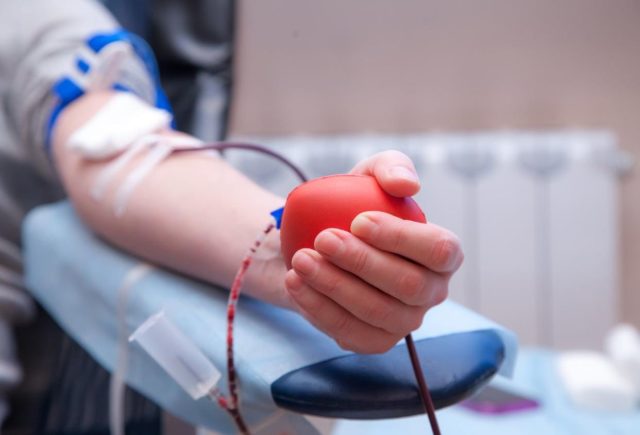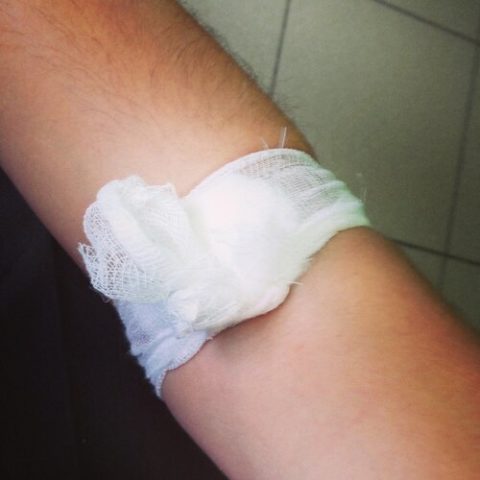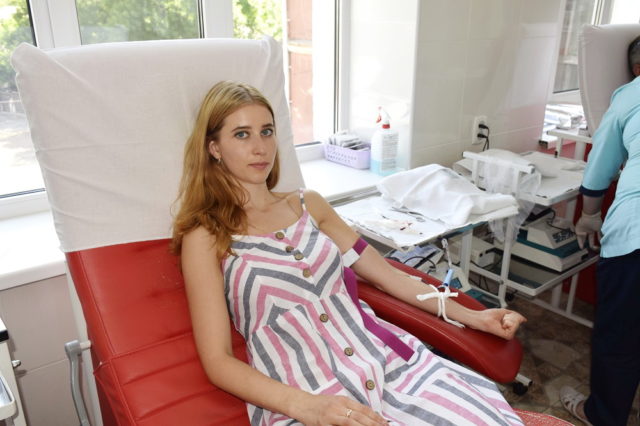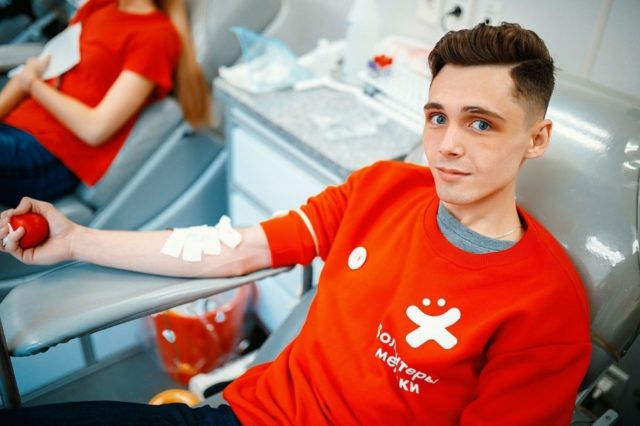Content
- 1 Is it useful or harmful to donate blood for donation to women, men
- 2 How blood donation affects the body
- 3 Conditions and rules for donating blood for donation for men and women
- 4 How much blood is taken when donating from men and women
- 5 How to donate blood
- 6 Contraindications to blood donation
- 7 How to recover from donating blood
- 8 Consequences of donating blood for donation for women and men
- 9 Conclusion
- 10 Reviews of women about blood donation
Donating blood for donation is not only honorable, but also useful. If there are no categorical contraindications to the procedure, then it will have a beneficial effect on the body and will only strengthen health.
Is it useful or harmful to donate blood for donation to women, men
When considering the issue of donation, many people fear negative health consequences. In fact, donating blood does not harm the body if the basic rules are followed.
Donation is even considered beneficial. First of all, before the procedure, a person undergoes a medical examination and gets the opportunity to check their health. Against the background of the regular delivery of biomaterial, immunity to minor blood loss is formed. The donor tolerates operations, trauma and moderate wounds more easily.
How blood donation affects the body
Donation is useful not only for patients in need of transfusion, but also for those who decide to donate biomaterial. Regular treatment serves to prevent ailments and relieve some of the unpleasant symptoms.
Why is it useful to donate blood for donation to men
The benefits of blood donation for the human body are expressed in the fact that the recovery processes begin to occur faster. The rate of renewal of biological fluid increases, the condition of blood vessels improves. Donation is a good prophylaxis against heart disease and is of particular benefit to men.

Why is it useful to donate blood for donation to women
Women need to be more careful when submitting biological material. They already face monthly blood loss due to their periods. But if the rules are followed, the following benefits of blood donation for a female donor are observed:
- the work of the heart and blood vessels improves;
- copious and painful menstruation is easier to tolerate;
- the blood in the body is constantly renewed, which has a beneficial effect on the work of the immune system.
Donor women are less likely to suffer from PMS and severe fatigue, weakness, and mood swings.
Conditions and rules for donating blood for donation for men and women
The health benefits and harms of donating blood depend on basic requirements being met. There are rules for the preparation and subsequent recovery after the procedure.
How old can you donate blood
According to Russian law, donation is allowed only after 18 years. Children and adolescents cannot donate their blood. The same applies to seniors over 60.
How often can you donate blood for donation?
By law, the delivery of biomaterial is allowed no more than five times a year for men and no more than four times for women. At the same time, doctors cannot carry out several fences at once without a break. In this case, the effect of blood donation on the body will become negative. The pause between procedures should be at least two months.
The indicated norms apply only to donation of whole blood. You can donate individual components of the biological fluid more often. For example, physicians can take plasma from the same donor about 20 times a year at minimum intervals of two weeks.
When can you donate blood for donation after dental treatment?
You cannot go to the delivery of biological material immediately after visiting the dentist. At least ten days must pass before the next donation. The rule is explained by the fact that after manipulations in the oral cavity, especially when removing teeth, there is an insignificant likelihood of bacterial complications, up to blood poisoning. The donor needs to wait a certain amount of time and make sure that the state of health does not deteriorate.
How to prepare before taking
Delivery of biomaterial requires minimal preparation from the donor. Before the procedure, you must refuse:
- from analgesics and other drugs with a thinning effect - in three days;
- from alcohol - in two days;
- from butter, milk, eggs and bananas, as well as spicy, smoked and fatty foods - on the eve of donating blood;
- from smoking - one hour before the procedure.
It is also better not to eat confectionery for two days before donation. But sweet compotes, fruit drinks and teas can and should be drunk. Also, the donor should have a good sleep before donating blood.

How much blood is taken when donating from men and women
Male donors donate no more than 450 ml of body fluid at a time. This loss is considered insignificant and safe for the body. For women, the norm is slightly lower - 350 ml. Before the procedure, donors of both sexes will have to give some more blood for the mandatory examination.
When plasma or platelets are donated, the sampling rate rises to 600 ml. At the end of the procedure, the device returns the "excess" biological fluid to the body, preliminarily removing the necessary components from it.
How to donate blood
The donor must come to the medical center with a passport proving his identity and Russian citizenship. The further procedure consists of several stages:
- The donor fills out a special questionnaire at the registry, specifying information about his own health, and then undergoes a medical examination. The latter includes the delivery of a biomaterial from a finger to determine the level of hemoglobin, group, Rh factor and kell-affiliation, as well as a visit to a transfusionist. The doctor conducts weighing and external examination, measures pressure and pulse rate, asks additional questions and makes a conclusion.
- If there are no contraindications for delivery, the donor visits the buffet and takes sweet tea with rolls. This is necessary to ensure good health during and after blood collection.
- In the treatment room, the donor is seated in a special comfortable chair and a rubber band is applied to the forearm. The elbow is disinfected, and then biological material is taken through a tube with a sterile needle.
The duration of the procedure is about ten minutes when donating whole blood. At the end of the material collection, the donor is covered with a tight bandage and it is recommended to sit quietly for about 15 minutes. After that, you can go home, any physical activity should be postponed for the next day.After donation, a person is entitled to a certificate granting the right to a two-day rest from work.

Contraindications to blood donation
The pros and cons of blood donation for the body depend on the state of health. There are absolute and temporary restrictions for the procedure. The latter are amenable to elimination, if the problem can be dealt with, then surrender will be allowed.
Absolute contraindications
With some diseases, donating blood for donation is strictly prohibited. Contraindications include:
- oncology;
- syphilis and HIV;
- tuberculosis and viral hepatitis;
- epilepsy and other diseases of the central nervous system;
- mental disorders;
- asthma and obstructive bronchitis;
- typhus;
- alcoholism and drug abuse;
- severe hypertension;
- cirrhosis and liver failure;
- hypoacid gastritis and stomach ulcer;
- cholecystitis and urolithiasis;
- atherosclerosis;
- brucellosis;
- chronic ENT diseases;
- visual impairment;
- lack of hearing or speech.
Biomaterials cannot be donated for coronary artery disease, heart defects, endocarditis and myocarditis. Blood loss in such cases is too dangerous for the health of the donor.
Temporary contraindications
There is a list of conditions in which a person cannot donate blood immediately, but has the right to return to the collection point later. Temporary contraindications include:
- fresh tattoos and piercings - less than a year from the date of application;
- allergic diseases in a state of exacerbation - you can take the biomaterial two months after the cure;
- SARS, flu and tonsillitis - after recovery, a month should pass;
- contact with a sick viral hepatitis - you can come to the first-aid post for donation in a year;
- recent vaccinations or tooth extractions - you need to wait ten days before taking the biomaterial;
- the use of drugs - when using antibiotics, you should wait two weeks, after taking analgesics, only three days;
- recent overseas business trips lasting more than two months - you can donate blood six months after returning;
- a long stay in America, Asia and Africa - before donation, you will have to wait three years.
After vaccination against the hepatitis B virus, it is impossible to donate a biomaterial for a year, and after undergoing a course of vaccinations against rabies - two weeks.

Contraindications to blood donation for women
Special contraindications are provided for women. They are not allowed to donate blood:
- within five days after the end of menstruation;
- during pregnancy;
- during breastfeeding and three months after it;
- within six months after an abortion.
Delivery of biomaterial in the listed situations can cause severe harm to a woman.
When you can't donate blood for donation to men
There are no specific contraindications for donation for men. They need to familiarize themselves with the general rules and prohibitions.
How to recover from donating blood
Although minor blood loss is not harmful to health, after donation, the body needs to recover. To speed it up, you need to:
- do not smoke for several hours after donating blood, so as not to slow down the circulation of oxygen in the tissues;
- immediately after the procedure, drink sweet tea to raise the glucose level and eat a hematogen bar;
- exclude sports and other loads for a day, ensure yourself maximum peace;
- give up alcohol, sweet soda and harmful semi-finished products for a few days;
- the first two days after donating blood for donation, consume more protein.

If, after donation, the state of health has deteriorated, it is necessary to lie on your back and raise your legs above your head to ensure proper blood circulation. Also, if you feel unwell, you can sit down and lower your head lower between your knees. If weakness, dizziness, and nausea persist, see your doctor.
Consequences of donating blood for donation for women and men
Whether it is dangerous to donate blood for donation depends on the state of health and compliance with the basic rules. With the right approach, the consequences are mostly beneficial. The biological fluid is renewed, the body is regularly cleansed. In people, immunity is strengthened, the risk of serious consequences in case of injury and burns decreases.
Doctors say donors are easier to tolerate blood loss in serious car accidents and have a higher chance of survival. There are studies showing an increased lifespan in people who regularly donate biomaterial. Donors are more likely to undergo medical examinations and better monitor their health, which ultimately ensures high-quality disease prevention and timely treatment.
The harm from the procedure lies only in weakness on the day of donation. Depending on the individual characteristics, the malaise can be noticeable or very insignificant. If you do not arrange unnecessary overloads for the body and follow the recommendations of doctors, blood sampling will not leave long-term negative consequences.
Conclusion
Donating blood for donation in good health is useful, the body is strengthened from this. But before going to the material collection station, you need to study the contraindications. In some conditions, donated blood is unusable or the procedure is too dangerous for the person himself.
Reviews of women about blood donation

